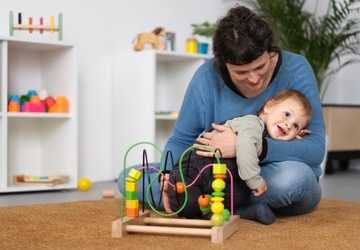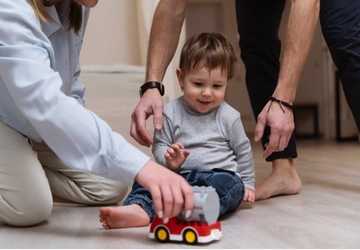Encouraging your baby's development through play is essential for early childhood development. Play isn't just fun; it's an important part of learning and development. This guide provides detailed and practical tips to help your baby engage in activities that build cognitive, motor, and social skills. From simple games like peekaboo to sensory activities and interactive toys, any playtime can boost your baby's overall development.
By incorporating these activities into your daily routine, you can create a nurturing environment that supports your baby's growth and encourages his curiosity and creativity.
Understand the Meaning of the Play

Play is essential for babies because it helps them develop motor, cognitive, and social skills. It's a natural way for babies to explore the world, learn new concepts, and build their brains. Babies learn to interact with their environment and the people around them through play.
Motor Skill Development
Tummy Time
What: Tummy time is when your baby is on his tummy while he's awake and supervised.
Why it's important: This activity strengthens the muscles in the neck, shoulders, and arms, preparing your baby for crawling and other motor skills.
Here's how: Start with short sessions of a few minutes at a time and gradually increase the time as your baby gets stronger. You can place toys within your baby's reach to encourage movement and engagement.
Grasping and Grasping
What it is: Encourage your baby to reach for objects.
Why it's important: This activity develops hand-eye coordination and fine motor skills.
Here's how: Provide toys that are easy to grasp and safe to put in the mouth. Soft rattles, teethers, and stuffed toys are all good choices. Place them within reach and encourage your baby to reach for them.
Cognitive Development
peek-a-boo
It is a simple game in which you hide your face and then reveal it again by saying, " peek-a-boo!"
Why it's important: This game promotes object permanence, the understanding that an object still exists even when you can't see it.
Here's how: Hide your face behind your hands, a blanket, or a toy, then reveal it with a smile. Encourage your baby to take turns hiding and showing.
Cause and Effect Toys
What it is: Toys that respond to actions, such as B. sounds or lights when you press a button.
Why they're essential: These toys help babies understand the concept of cause and effect, an important cognitive milestone.
How to use them: Introduce musical instruments, pop-up toys, or simple electronic toys. Show your baby how to activate these features and encourage him to try them.
Social and Emotional Development
Interactive Play
What it is: Engage your baby in activities that require two-way interaction.
Why it's essential: This type of play promotes the development of social skills and emotional connections.
How to do it: Simple activities like talking, singing, and making faces. Respond to your baby's coos and babbling and imitate his sounds to encourage communication.
Storytime
What it is: Read to your baby, even young.
Why it's important: Reading promotes language development and encourages a love of books.
Here's how: Choose books with colourful images and simple text. Read aloud with expression, point to pictures, name objects, and describe actions.
Sensory Development
Sensory Bins
What it is: Containers with different textures and materials for babies to explore.
Why it's essential: Sensory bins promote tactile development and sensory processing.
How to use them: Fill a shallow container with safe objects like rice, water beads, or pieces of fabric. Supervise your baby as he explores and describes the textures he feels.
Music and Dance
What it is: Play music and move to the beat with your baby.
Why it's essential: Music stimulates hearing development, and exercise improves motor skills.
Here's how: Play different types of music and encourage your baby to move with you. Using instruments like shakers or tambourines can be more fun.
Encourage Independent Play
Safe Play Area
What it is: A designated area where your baby can safely play alone.
Why it's important: Independent play promotes creativity and confidence.
How to: Set up a play area with soft cushions, safe toys, and no sharp edges. Let your baby explore independently while you supervise them from a distance.
Rotation of Toys
What: Regularly rotate the toys your baby uses.
Why it's important: This keeps play fun and sparks curiosity.
Here's how: Swap out a few toys for new ones every week or so. You don't need a lot of toys; even simple household items like wooden spoons and plastic containers can be exciting.
Tips for Safe Play

Supervision: Always supervise your baby during play, especially with new activities and toys. Make sure the play area is safe and free of hazards.
Age-appropriate toys for your baby: Choose appropriate for your baby's age and developmental stage. Avoid toys with small parts that can pose a choking hazard.
Cleanliness: Clean toys and play areas regularly to prevent the spread of germs. This is especially important for items in your baby's mouth.
Adapt to Your Baby's Needs
Follow the Cues
What it means: Pay attention to your baby's cues while playing.
Why it's important: Every baby is different, and knowing their preferences and limitations helps to have a positive play experience.
Here's how to do it: Notice when your baby is engaged and having fun but also when he or she seems tired or overstimulated. Adjust activities accordingly.
Encourage Exploration
What it means: Give your baby the freedom to explore their surroundings.
Why it's important: Exploration encourages curiosity and learning.
Here's how: Childproof your home and create a safe environment for exploration. Let your baby run around and check out different objects and rooms.
Conclusion
Encouraging your baby's development through play is a rewarding experience that builds the foundation for future growth. By incorporating various activities that target motor, cognitive, social, and sensory skills, you can create a rich and stimulating environment for your baby. Remember to follow your baby's cues, stay safe while playing, and, most importantly, enjoy this special time together.
This comprehensive approach to play will help your baby develop important skills while having fun. Each play activity is a building block that contributes to his overall development and prepares him for the exciting milestones ahead.
